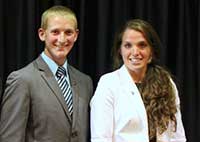It is the season when many breed associations have conventions and often youth awards are presented at these annual events. Some awards require interviews to select the top recipients. In preparation for these times, here are a few things to keep in mind.
An interview follows the printed application. The form should be an accurate reflection of the body of work the young person has accomplished, but the interview is a living and breathing application. It allows the judges to get to know the applicant better and ask further questions.

Before the interview
The interview
The applicant should answer questions with details to add validity to their responses. Statements like "I help feed calves" is too general. How many times per week? How many calves? Who are you helping or are you doing it alone? How are they housed (hutches, pens)? Are they fed waste milk, milk replacer or pasteurized milk? When details are provided it helps determine the knowledge and level of understanding of the task they are conducting.
Judges have responsibilities, too. They ask questions to help learn about the individual. Rather than asking "Who is your favorite cow?" a better way would be, "Tell us about your favorite cow." This gives them a chance to provide supportive information. When judges ask questions that cannot be one-word answers, it helps the interview seem more like a conversation and not an interrogation. Questions that draw one-word answers lead youth to think they can only answer the question directly and not add more details to help explain their answer. The wording of the question can be critical in the flow and feel of the interview.
During the interview, the judges should ask for the applicant's opinion. If not, they could learn all they wanted for the written application. Asking opinions shows if the youth can indeed make a choice – their beliefs on a topic and follow-up with supportive information. Where is the best state to dairy? The gut response would be to name your home state, but what do other states offer? Naming a different state does not change your allegiance but shows that the applicant is familiar with the advantages and disadvantages of their own state as well as other locations.
There can be a range of ages for some awards. Judges should not assume that the younger applicants are not as knowledgeable as older ones. Allow the younger member to answer the question to learn what they know; they just might surprise you!
When the winners are announced, some in the audience may be surprised by the results. It may not be the most well-known or trophy-laden individual. The questions asked in an interview helps determine the winner, of whom most in the audience have not heard. Sometimes the most qualified applicant does not win. They were ineffective in expressing themselves in the interview. A difficult concept for young people to convey in an interview is confidence in their achievements. They may feel they are bragging and therefore don't share their successes. Giving too much in this area can become an issue, too. However, the lessons learned during those victories is what should be the focus, not the award itself. But not giving enough detail can shortchange a well-qualified applicant.
Interviewing is a skill that should be practiced if someone wants to do well. But remember, there must be experience and content behind that well-presented interview. Preparing for interviews will help candidates be more comfortable and therefore do their very best.

The author is the online media manager and is responsible for the website, webinars and social media. A graduate of Modesto Junior College and Fresno State, she was raised on a California dairy and frequently blogs on youth programs and consumer issues.
An interview follows the printed application. The form should be an accurate reflection of the body of work the young person has accomplished, but the interview is a living and breathing application. It allows the judges to get to know the applicant better and ask further questions.

Before the interview
- Know the award details – requirements, history of the award (named for an individual), expectations of the winner (another level of competition).
- Dress appropriately – clothes ironed, belt, clothes that fit. Interviews are conducted seated, so the length of a skirt or dress should not be too short as the candidate should not continually pull or tug on it. And if you are wearing new shoes, be sure to break them in. Being uncomfortable in what you wear will make you less at ease when you speak. And teenagers grow fast, so check the pant length before the interview. Also, don't forget the dark socks. Being prepared for the interview is more than just what you say.
- Small items – Hair brushed or combed, no chewing gum.
- Be on time – or better yet, be a bit early. You don't want to be rushed trying to find the interview room and then walk directly into the interview. Take a few minutes to relax before you start. If they are running ahead of schedule, you do not want them looking for you.
The interview
The applicant should answer questions with details to add validity to their responses. Statements like "I help feed calves" is too general. How many times per week? How many calves? Who are you helping or are you doing it alone? How are they housed (hutches, pens)? Are they fed waste milk, milk replacer or pasteurized milk? When details are provided it helps determine the knowledge and level of understanding of the task they are conducting.
Judges have responsibilities, too. They ask questions to help learn about the individual. Rather than asking "Who is your favorite cow?" a better way would be, "Tell us about your favorite cow." This gives them a chance to provide supportive information. When judges ask questions that cannot be one-word answers, it helps the interview seem more like a conversation and not an interrogation. Questions that draw one-word answers lead youth to think they can only answer the question directly and not add more details to help explain their answer. The wording of the question can be critical in the flow and feel of the interview.
During the interview, the judges should ask for the applicant's opinion. If not, they could learn all they wanted for the written application. Asking opinions shows if the youth can indeed make a choice – their beliefs on a topic and follow-up with supportive information. Where is the best state to dairy? The gut response would be to name your home state, but what do other states offer? Naming a different state does not change your allegiance but shows that the applicant is familiar with the advantages and disadvantages of their own state as well as other locations.
There can be a range of ages for some awards. Judges should not assume that the younger applicants are not as knowledgeable as older ones. Allow the younger member to answer the question to learn what they know; they just might surprise you!
When the winners are announced, some in the audience may be surprised by the results. It may not be the most well-known or trophy-laden individual. The questions asked in an interview helps determine the winner, of whom most in the audience have not heard. Sometimes the most qualified applicant does not win. They were ineffective in expressing themselves in the interview. A difficult concept for young people to convey in an interview is confidence in their achievements. They may feel they are bragging and therefore don't share their successes. Giving too much in this area can become an issue, too. However, the lessons learned during those victories is what should be the focus, not the award itself. But not giving enough detail can shortchange a well-qualified applicant.
Interviewing is a skill that should be practiced if someone wants to do well. But remember, there must be experience and content behind that well-presented interview. Preparing for interviews will help candidates be more comfortable and therefore do their very best.

The author is the online media manager and is responsible for the website, webinars and social media. A graduate of Modesto Junior College and Fresno State, she was raised on a California dairy and frequently blogs on youth programs and consumer issues.








